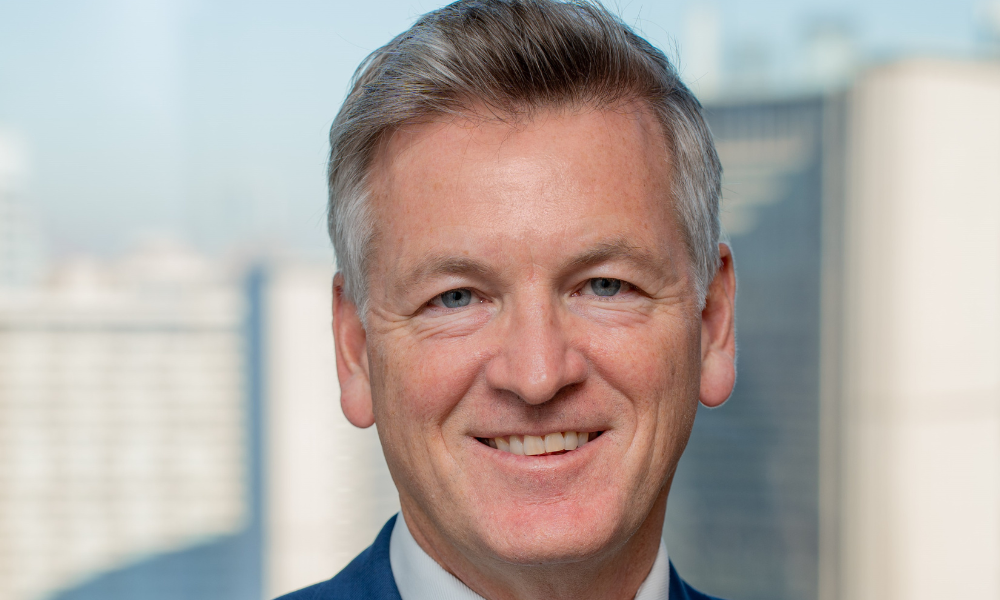Photo: Michael Kelly
Michael Kelly is the chief legal & sustainability officer of OMERS, leading the pensions fund’s approach to sustainable investing and ESG.
For our CL Talk podcast, he discussed managing stakeholder and investor expectations in a changing sustainability landscape. Kelly will appear on a panel examining this topic at Canadian Lawyer’s ESG Summit on October 30 in Toronto.
Listen to our full podcast episode here:
This episode can also be found on our CL Talk podcast homepage, which includes links to follow CL Talk on all the major podcast providers.
Below is a summary of the conversation, edited for length and clarity:
Tell me about your role and how it has evolved over the past decade at OMERS?
I'm the chief legal and sustainability officer at OMERS, a $130 billion pension plan serving municipal employees, firefighters, and police officers in Ontario. I’ve been with OMERS for 18 years. For the first eight, I was a lawyer in the infrastructure team, working on M&A transactions. About 10 years ago, I transitioned to the chief legal officer role. Five years ago, with the rise of the ESG movement, which brought climate change to the forefront of board and executive discussions, I took on the sustainability responsibilities. My legal background helped me develop governance structures and policies around how OMERS addresses these issues, including climate change.
How does OMERS integrate ESG into its investment strategy, and what challenges arise when balancing returns with sustainability?
We don't see it as a trade-off between returns and sustainable investing. As fiduciaries, we focus on delivering pensions, but we adopt a holistic approach to investments, considering ESG factors alongside traditional ones. Being a long-term investor, our relationship with members often spans decades, so sustainability aligns well with our outlook. The challenge is ensuring that stakeholders understand that we integrate these factors because they impact value, risk, and opportunity. Our board-level policy outlines our ESG strategy, which is implemented through guidelines and specific due diligence questions for investments, covering E, S, and G factors.
Can you share examples of how this approach plays out in your sustainable investing committee, especially regarding climate risks?
We have a sustainable investing committee at OMERS, which I chair. It includes various investing groups across our decentralized organization – like infrastructure, real estate, private equity, and capital markets – along with functional areas like risk, finance, legal and communications. The committee meets monthly to share best practices and strategies, such as when we developed our climate action plan. This plan includes short-term goals like a 20 percent reduction in portfolio emissions by 2025, 50 percent by 2030, and achieving net zero by 2050. We also expect our top-emitting portfolio companies to have credible transition plans by 2030. Our due diligence includes assessing factors like carbon pricing, government policies, and evolving technologies, especially when considering investments in sectors like fossil fuels.
How do you balance differing expectations from stakeholders in your role?
We have a diverse group of stakeholders, primarily our members and their employers, as OMERS is a jointly sponsored plan with contributions split 50/50. Members care deeply about how their pension funds are invested, and issues like climate change are top priorities at events like our annual general meeting. We emphasize that our approach is grounded in financial returns while integrating material ESG factors. Beyond members and employers, other parties, including NGOs and the broader investment community, also pay attention to our actions, particularly regarding our climate goals. Being responsive to their concerns is part of the responsibility that comes with managing significant capital.
You also sit on the boards of organizations like the Investor Leadership Network and the Canadian Coalition for Good Governance. How do these roles influence ESG policies in Canada?
Collaborating with like-minded organizations allows us to amplify our impact. For instance, the Investor Leadership Network, which started at the G7 meetings in 2018, focuses on sustainable finance in areas like climate, inclusion and diversity, and sustainable infrastructure in developing markets. By working together, we can influence policy more effectively, share best practices, and create resources like white papers that support smaller investors. This collaboration helps us be more impactful and learn from each other.
OMERS has global investments. How does Canada’s ESG framework compare to others you encounter internationally?
Broadly, Europe tends to be more proactive on issues like climate compared to North America or Asia. However, Canada has been a leader in areas like carbon pricing, which economists often see as the most efficient way to reduce emissions. While a global carbon price is ideal, it’s challenging to achieve. Each country’s approach varies, making it complex for global investors like OMERS to align strategies. For example, Canada’s carbon pricing contrasts with the US's incentives-driven approach through the Inflation Reduction Act. Canada is also developing a definition for transition assets to direct capital toward making industries greener, which is particularly important for resource-based economies like ours. Greater harmonization of these policies would benefit investors, but it’s difficult to achieve.
What advice would you give to general counsel transitioning from a law firm to an in-house role, especially with the complexities of global ESG frameworks?
First, don’t underestimate the complexity of this field. You might need to rely on external advisors. At OMERS, we can draw on advice globally, but as an in-house counsel, you’re often coordinating this information. It’s essential to work closely with your finance and sustainable investing teams, especially given the current focus on disclosure and accounting rules. Lawyers often serve as facilitators in this space, translating complex regulatory concepts into actionable strategies for the C-suite and board.
What are some key lessons you've learned in your role in ESG?
One important lesson is finding champions within your organization who understand the importance of sustainability, as it can be easy for these broad issues to get lost in daily operations. Be clear about your goals – for us, it’s about integrating sustainability into investment, not just corporate social responsibility. Don’t let the perfect be the enemy of the good; progress often comes incrementally. You also need to be resilient, as regulations and standards are constantly evolving. Understanding your colleagues’ perspectives is crucial, especially those focused on returns. ESG has become politicized, particularly in the US, so it’s important to separate the politics from the substantive aspects that impact investment performance. Ultimately, focusing on what’s material to each investment is key.





